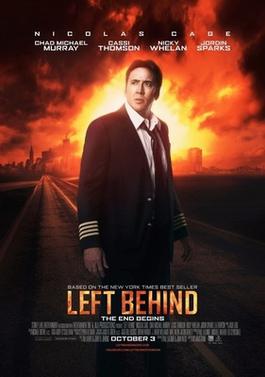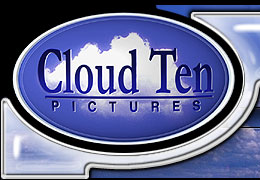Evangelical cinema and horror movies: the comparison might seem perverse, but I say it’s valid. Consider…
As with horror cinema, evangelical filmmaking has over the decades risen to new, though definitely not better, heights. Most recently  the “Holy Indie” movie model hit a new pinnacle of sorts with the October 3 release of LEFT BEHIND from Cloud Ten Pictures, a remake of the 2000 evangelical smash of the same name.
the “Holy Indie” movie model hit a new pinnacle of sorts with the October 3 release of LEFT BEHIND from Cloud Ten Pictures, a remake of the 2000 evangelical smash of the same name.
The new LEFT BEHIND is a far cry from the old days of Holy Indies, examples of which include the legendary 1971 scare fest IF FOOTMEN TIRE YOU, WHAT WILL HORSES DO?, as well as the highly influential end of the world quartet made by the late Mark IV Pictures, which commenced with the trashily entertaining THIEF IN THE NIGHT in 1972 and concluded with the insufferable PRODIGAL PLANET in 1983. Mark IV made other films (such as ALL THE KING’S HORSES, a hilarious domestic drama in which future horror movie queen Dee Wallace learns that her marriage is failing because she isn’t being submissive enough), but A THIEF IN THE NIGHT and its offspring remain their signature “achievements,” and provided the template for quite a few future evangelical movies.
Examples include the straight-to-video APOCALYPSE from 1998, the inaugural release from the aforementioned Christian moviemaking outfit Cloud Ten Pictures. APOCALYPSE once again dealt with the end of the world, and became a huge seller on video. It was followed by more end-of-the-world themed dramas, including THE MOMENT AFTER, GONE and THE OMEGA CODE. The latter was a definite game changer in 2000 with its impressive (by indie standards) $13 million theatrical gross. The original LEFT BEHIND, yet another end-of-the-world movie, achieved a similar level of success in the straight-to-DVD market.
This led to a number of alterations in the evangelical movie make-up, most notably higher budgets and C-list stars. See APOCALYPSE’S sequels REVELATION and TRIBULATION, which featured the likes of Jeff Fahey, Carol Alt, Gary Busey and Mr. T(!), while THE OMEGA CODE’S 2001 follow-up MEGIDDO boasted “names” like Michael York, Michael Biehn and Udo Kier. Now, with the new Nicolas Cage headlined LEFT BEHIND, Christian moviemakers have advanced from C to B-plus caliber actors (which doesn’t negate the fact that the once-mighty Cage has become box office poison in recent years).
The mega-successful release of Mel Gibson’s PASSION OF THE CHRIST in 2004 got Hollywood into the act with major studio offshoots like Fox Faith, and big-budget Christian themed movies like NOAH and HEAVEN IS FOR REAL. For the most part, however, evangelical filmmaking has remained a staunchly independent operation—hence the term Holy Indies.
 The major differences between the Mark IV films and today’s Christian cinema is that such films no longer have to rely on church donations for financing, or the deep pockets of millionaire televangelists (as APOCALYPSE did with TV preacher Jack Van Impe and THE OMEGA CODE with Trinity Broadcasting Network founder Paul Crouch). Cloud Ten Pictures, in fact, is now an extremely lucrative outfit, having been called “one of the most successful indie studios in the English speaking world” by the National Post. There are also countless blogs and websites dedicated to reviewing these films that of course rarely ever have a bad word to say about them, which of course is something they have in common with a lot of horror movie review websites.
The major differences between the Mark IV films and today’s Christian cinema is that such films no longer have to rely on church donations for financing, or the deep pockets of millionaire televangelists (as APOCALYPSE did with TV preacher Jack Van Impe and THE OMEGA CODE with Trinity Broadcasting Network founder Paul Crouch). Cloud Ten Pictures, in fact, is now an extremely lucrative outfit, having been called “one of the most successful indie studios in the English speaking world” by the National Post. There are also countless blogs and websites dedicated to reviewing these films that of course rarely ever have a bad word to say about them, which of course is something they have in common with a lot of horror movie review websites.
But this success has come with a price. Part of the charm of the early evangelical films, I’d argue, was their homemade aesthetic, which combined with the earnestness of their content make for irresistible bad movie fun—an appeal not unlike that of quite a few classic horror films. The slickness of the new, bigger budgeted evangelical films only serves to dilute their charm.
A far more grievous horror-evangelical movie similarity is the loss of originality: how many end-of-the-world dramas do we need? And did LEFT BEHIND really have to be remade (and a mere 14 years after the original)? As with CARRIE, THE EVIL DEAD, FRIDAY THE THIRTEENTH and countless other examples, my answer to that question is a big NO! Independent filmmaking has always worked best as an alternative to Hollywood’s output, and incestuous remakes, regardless of what genre they occupy, hardly constitute such an example.
As for the new LEFT BEHIND’S spiritual credentials, I think a quote from Christianity Today magazine best sums it up: “(The filmmakers) want churches to book whole theaters…all the while netting them cash, without ever having to have cared a shred about actual Christian belief. They want to trick you into caring about the movie. Don’t.”
Ultimately the trajectory of evangelical cinema serves as an object lesson in how to achieve enormous success in an independent movie platform, and also how to reverse that momentum as quickly as possible.
